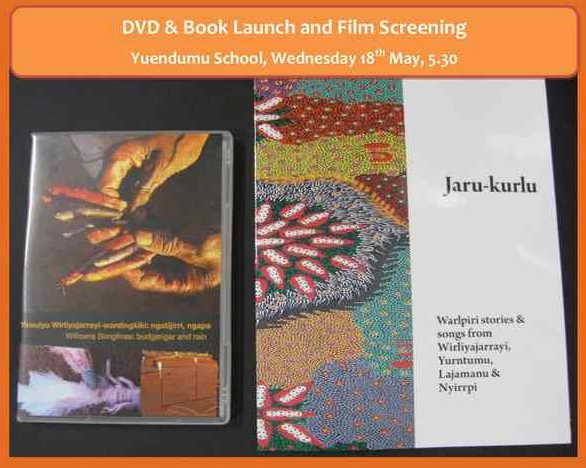The annual meeting of Warlpiri-patu-kurlangu Jaru Inc. and its professional development workshop known as Warlpiri Triangle this year is being hosted by Yuendumu CEC, 16-19 May 2011.
This evening in the Yuendumu school library two resources were launched to a large gathering including senior Warlpiri women.
1. JARU-KURLU: Warlpiri stories & songs from Wirliyajarrayi, Yurntumu, Lajamanu & Nyirrpi. Trafford Publishing, who have an address in Bloomington, Indiana; also available through Amazon and Borders. Update 1 July 2011: 20 May 2011: Amazon is unable to filling an orders nowat this stage; try again in a few weeks.
The book was presented by Fiona Gibson Napaljarri, who wrote its (bilingual) Foreword.
The large format booklet comprises 17 stories told by senior Warlpiri women from the four Warlpiri communities named in the title. The stories are written out in the main 33 pages, and spoken and sung on the accompanying audio CD (Update 20 25 May 2011: CD not will be included with published version) with 17 tracks; the English translations are on the last 8 pages. The book includes wordlists and comprehension questions for each of the 21 stories. The topics are Warlpiri Dreamings and places, and traditional plant use.
The stories were recorded in 2000 by Angela Harrison (then NTDE Language Resource Officer), and a song was recorded by Georgia Curran (then an ANU PhD student) at the 2006 Warlpiri-patu-kurlangu Jaru workshop. The transcription and translation formed part of work by Warlpiri students at the Centre for Australian Languages and Linguistics (CALL) at Batchelor Institute (BIITE). It is notable that all involved are women: all the twelve story tellers and singers, all 28 named Warlpiri teachers and students, and all five linguists involved. (There are some men’s names among the credits for the illustrative photographs spread through the Warlpiri section.)
Funding: NT Department of Education Employment and Training, Institute for Aboriginal Development (IAD), Channel 7 Children’s Fund, and the Warlpiri Education and Training Trust (WETT). Funding for publication came from Trafford First Voices Publishing Program.
2. Yawulyu Wirliyajarrayi-wardingkiki: ngatijirri, ngapa / Willowra Songlines: budgerigar and rain. DVD © Willowra Community
The performers, Willowra women, were recorded in April and June 2009.
The DVD was presented to us by Maisie Kitson Napaljarri with remarks by Dora Kitson Napaljarri and Mary Laughren.
Funding and other support was cobbled together by Myfany Turpin and Mary Laughren from a range of sources including the Australian Research Council (ARC), Janganpa Aboriginal Corporation and the Central Land Council (CLC) (through its Indigenous Ecological Knowledge Program (IEKP)), the NT Natural Resource Management Board, The Hans Rausing Endangered Languages Documentation Project (Arcadia Trust), Queensland Conservatorium Griffith University, and The University of Queensland. Support also came from CSIRO Alice Springs, in the form of Fiona Walsh’s wildlife video used to good effect by the video editor Wiriya Sati.
Myf Turpin and Mary Laughren have described the production, and insights into Warlpiri songs, in some recent presentations:
- ‘Edge effects in Warlpiri Yawulyu songs: resyllabification, epenthesis & final vowel modification’ at the March 2011 ALW (2.9MB PDF linked from ALW 2011).
- ‘Presenting the Yawulyu Wirliyajarrayi-wardingkiki DVD: value-added product of multi-disciplinary research’ (abstract) at ANU on 12 April 2011
A notable feature is the subtitling of the songs, with English translation, synchronised with the singing and the visuals. There is an Extras / Panukari section which includes maps. It is hoped that the DVD can suggest a model for presenting traditional Warlpiri knowledge in a contemporary format.
A primary purpose for which these resources have been produced is to help guide the education of young Warlpiri people.

 Follow
Follow
Here at Endangered Languages and Cultures, we fully welcome your opinion, questions and comments on any post, and all posts will have an active comments form. However if you have never commented before, your comment may take some time before it is approved. Subsequent comments from you should appear immediately.
We will not edit any comments unless asked to, or unless there have been html coding errors, broken links, or formatting errors. We still reserve the right to censor any comment that the administrators deem to be unnecessarily derogatory or offensive, libellous or unhelpful, and we have an active spam filter that may reject your comment if it contains too many links or otherwise fits the description of spam. If this happens erroneously, email the author of the post and let them know. And note that given the huge amount of spam that all WordPress blogs receive on a daily basis (hundreds) it is not possible to sift through them all and find the ham.
In addition to the above, we ask that you please observe the Gricean maxims:*Be relevant: That is, stay reasonably on topic.
*Be truthful: This goes without saying; don’t give us any nonsense.
*Be concise: Say as much as you need to without being unnecessarily long-winded.
*Be perspicuous: This last one needs no explanation.
We permit comments and trackbacks on our articles. Anyone may comment. Comments are subject to moderation, filtering, spell checking, editing, and removal without cause or justification.
All comments are reviewed by comment spamming software and by the site administrators and may be removed without cause at any time. All information provided is volunteered by you. Any website address provided in the URL will be linked to from your name, if you wish to include such information. We do not collect and save information provided when commenting such as email address and will not use this information except where indicated. This site and its representatives will not be held responsible for errors in any comment submissions.
Again, we repeat: We reserve all rights of refusal and deletion of any and all comments and trackbacks.